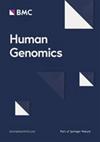Deep learning-based pathway-centric approach to characterize recurrent hepatocellular carcinoma after liver transplantation
IF 3.8
3区 医学
Q2 GENETICS & HEREDITY
引用次数: 0
Abstract
Liver transplantation (LT) is offered as a cure for Hepatocellular carcinoma (HCC), however 15–20% develop recurrence post-transplant which tends to be aggressive. In this study, we examined the transcriptome profiles of patients with recurrent HCC to identify differentially expressed genes (DEGs), the involved pathways, biological functions, and potential gene signatures of recurrent HCC post-transplant using deep machine learning (ML) methodology. We analyzed the transcriptomic profiles of primary and recurrent tumor samples from 7 pairs of patients who underwent LT. Following differential gene expression analysis, we performed pathway enrichment, gene ontology (GO) analyses and protein-protein interactions (PPIs) with top 10 hub gene networks. We also predicted the landscape of infiltrating immune cells using Cibersortx. We next develop pathway and GO term-based deep learning models leveraging primary tissue gene expression data from The Cancer Genome Atlas (TCGA) to identify gene signatures in recurrent HCC. The PI3K/Akt signaling pathway and cytokine-mediated signaling pathway were particularly activated in HCC recurrence. The recurrent tumors exhibited upregulation of an immune-escape related gene, CD274, in the top 10 hub gene analysis. Significantly higher infiltration of monocytes and lower M1 macrophages were found in recurrent HCC tumors. Our deep learning approach identified a 20-gene signature in recurrent HCC. Amongst the 20 genes, through multiple analysis, IL6 was found to be significantly associated with HCC recurrence. Our deep learning approach identified PI3K/Akt signaling as potentially regulating cytokine-mediated functions and the expression of immune escape genes, leading to alterations in the pattern of immune cell infiltration. In conclusion, IL6 was identified to play an important role in HCC recurrence.以深度学习为基础、以通路为中心的肝移植后复发性肝细胞癌特征描述方法
肝移植(LT)是治疗肝细胞癌(HCC)的一种方法,但15-20%的患者在移植后会复发,而且复发的肝细胞癌往往具有侵袭性。在这项研究中,我们研究了复发 HCC 患者的转录组图谱,利用深度机器学习(ML)方法识别差异表达基因(DEGs)、相关通路、生物学功能以及移植后复发 HCC 的潜在基因特征。我们分析了7对接受LT治疗的患者的原发性和复发性肿瘤样本的转录组图谱。在差异基因表达分析之后,我们进行了通路富集、基因本体(GO)分析以及前 10 个枢纽基因网络的蛋白质-蛋白质相互作用(PPI)分析。我们还利用 Cibersortx 预测了浸润免疫细胞的分布情况。接下来,我们利用癌症基因组图谱(TCGA)的原始组织基因表达数据,开发了基于通路和GO术语的深度学习模型,以确定复发性HCC的基因特征。PI3K/Akt信号通路和细胞因子介导的信号通路在HCC复发中尤其活跃。在前10个中心基因分析中,复发肿瘤表现出免疫相关基因CD274的上调。在复发的HCC肿瘤中,单核细胞的浸润显著增加,M1巨噬细胞的浸润降低。我们的深度学习方法确定了复发性 HCC 中的 20 个基因特征。通过多重分析发现,在这20个基因中,IL6与HCC复发有显著相关性。我们的深度学习方法发现,PI3K/Akt 信号可能调节细胞因子介导的功能和免疫逃逸基因的表达,从而导致免疫细胞浸润模式的改变。总之,IL6在HCC复发中发挥着重要作用。
本文章由计算机程序翻译,如有差异,请以英文原文为准。
求助全文
约1分钟内获得全文
求助全文
来源期刊

Human Genomics
GENETICS & HEREDITY-
CiteScore
6.00
自引率
2.20%
发文量
55
审稿时长
11 weeks
期刊介绍:
Human Genomics is a peer-reviewed, open access, online journal that focuses on the application of genomic analysis in all aspects of human health and disease, as well as genomic analysis of drug efficacy and safety, and comparative genomics.
Topics covered by the journal include, but are not limited to: pharmacogenomics, genome-wide association studies, genome-wide sequencing, exome sequencing, next-generation deep-sequencing, functional genomics, epigenomics, translational genomics, expression profiling, proteomics, bioinformatics, animal models, statistical genetics, genetic epidemiology, human population genetics and comparative genomics.
 求助内容:
求助内容: 应助结果提醒方式:
应助结果提醒方式:


